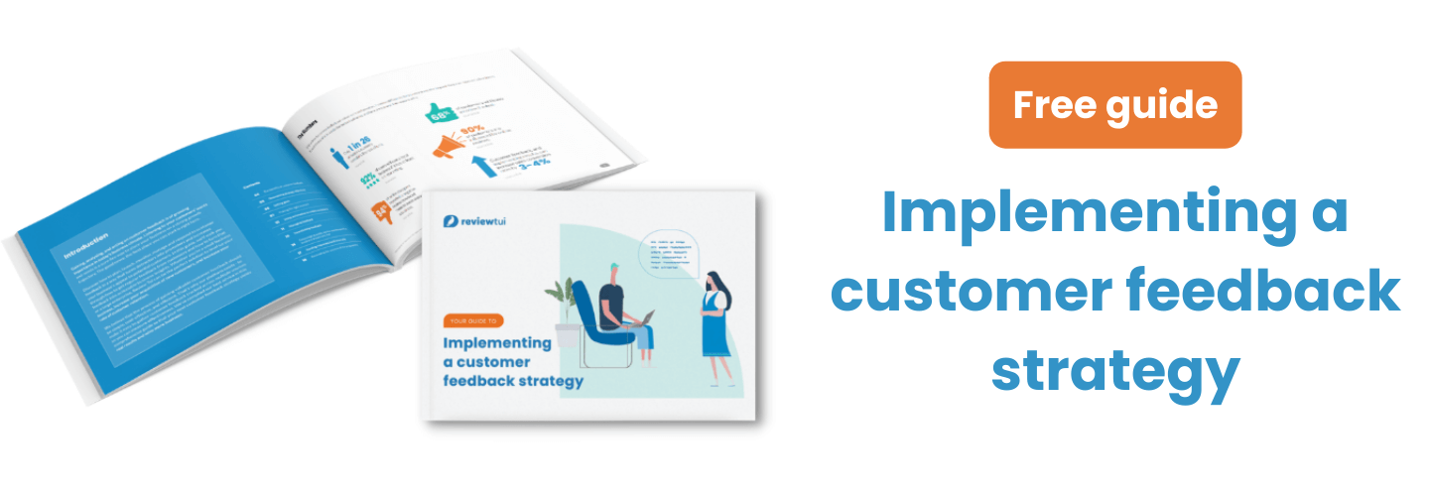Which is more important; customer reviews or customer feedback?
Although customer feedback and reviews are often used interchangeably, they are not the same thing.
There are a few ways in which customer feedback and reviews differ, even though they have a lot in common. In this article, we will examine the distinction between the two, so that you can develop a winning strategy for growth.
What is a customer review?
Typically, reviews are unprompted, non-solicited comments gathered on an open, third-party platform. Customers can read these reviews to determine if a brand or product is worth investing in.
There are many places where users check reviews, popular ones being Google, Trip Advisor, Trivago, and Facebook. Because these are external platforms, businesses cannot filter or delete negative reviews.
Benefits of customer reviews
While customer reviews are outside of a brand’s jurisdiction, they can still be leveraged for success. By encouraging happy customers to leave reviews and displaying reviews on your brand website, there are several key benefits you’ll notice:
Increased trust in your brand
Reviews provide customers with the information they need from a completely objective source which means they can trust what they say. Nearly 9 out of 10 consumers read reviews before purchasing anything.
On average, people will read 10 review entries before deciding whether to trust a brand. That’s because, unlike advertising, reviews provide social proof in the form of first-hand observations.
Proof of industry authority
When a customer review reaffirms the claims that a brand makes, its credibility is strengthened. If most reviews are positive, the legitimacy of the business is validated.
The more authoritative a brand is in its given industry, the more likely a prospective customer will have confidence in them to deliver. The only way to achieve this is by following through on promises and fulfilling the high-quality service that your customers expect.
An increase in online traffic
Statistics show that brands with the most and highest review ratings receive the most visitors. As traffic increases, a constant cycle is triggered as numerous people leave reviews and credibility grows.
In fact, 72% of customers will only take action after reading at least one positive review.
So the higher number of reviews, the more likely people are to venture beyond the search results to visit the company website.
Do customers care about reviews?
In a jam-packed world of advertising, customers are bombarded with information from brands competing for attention. Because of this, most customers have grown resistant to advertising and tend to trust reviews from other customers instead.
Since existing customers have no hidden agenda or sales quota to meet, prospective buyers believe reviews are 12 times more reliable than a brand’s claims. So, to ensure your target audience is willing to part with their money, you need to encourage your happy customers to leave a wealth of glowing reviews.
What is customer feedback?
Unlike reviews, customer feedback is something businesses ask for, often in the form of a survey or interview. The responses customers give can be used to improve the business processes and resolve common problems in the Customer Experience.
Feedback is processed internally, with only members of the organisation able to see it. This way, the business can make informed decisions and measure customer satisfaction without having to publicise any of the data.
Benefits of customer feedback
Unless the brand chooses to do so as a testimonial, customer feedback isn't publicly revealed. That way, there are plenty of benefits the brand can take advantage of.
Makes customers feel valued
Asking customers for feedback is a highly effective tactic to make them feel valued. By reaching out to your users at certain touch points in the buyer's journey, you can demonstrate a willingness to make relevant changes and improve the Customer Experience.
Increases customer retention
The sooner you improve your business processes in favour of customers, the more likely they are to return for another purchase. Since focusing on existing customers is more cost-effective than on new prospects, this is a proven strategy for growing revenue. Additionally, loyal customers spend 67% more than new ones, largely because they are already familiar with the values, benefits, and entire experience.
Informs business decisions
When it comes to developing strategies for your business, it’s vital to have the right data to inform your decisions. Particularly when there are changes to be made to the Customer Experience, choosing the right course of action can be daunting.
That’s why asking customers directly what would appreciate is the best place to start. This way, you can be confident that your actions are backed up with real-world information.
Do customers care about giving feedback?
When a business is open to feedback, customers appreciate the openness and willingness to make improvements. The act of asking for feedback demonstrates that a brand values its audience which is a huge advantage over its competitors.
To prove that your brand is always seeking to improve your customer’s experience, you need to be asking for their input. Not only does it show that you care, but it also allows you to make effective changes more quickly. Instead of haphazardly changing things with no rational basis, your customers can tell you exactly what matters to them.
For this reason, customers appreciate the opportunity to respond and share their insights. Add something about response rates.
The balance between feedback and reviews
While it would be nice if one was more important than the other, both reviews and feedback are critical elements of business success. The key is knowing how to ask for them and generate the best possible responses so that you can use them strategically.
Ultimately, you should be engaging with both channels of communication because they serve two different roles. Fortunately, we know all the best strategies to get started.
How to get feedback and reviews:
- Ask for feedback at different times in the customer journey, such as after a purchase or in a website popup.
- Encourage more online reviews by sending request links after purchase or delivery.
- Use a specialised feedback platform to collate and distribute feedback surveys.
- Use a variety of question types in your surveys.
- Make the process as easy as possible for customers.
- Use multiple communication channels to target more people.
- Respond to every review publicly in a positive manner, even if they are dissatisfied.
- Keep surveys short and straightforward, this is proven to increase response rates.
If getting a headstart on all of this sounds good to you, Review Tui can help. To make the whole process as easy as can be, our platform features HubSpot integration, survey building, powerful metrics, and an easy-to-use dashboard.
For more helpful features and advice, sign up for our software or download this practical step-by-step guide.



